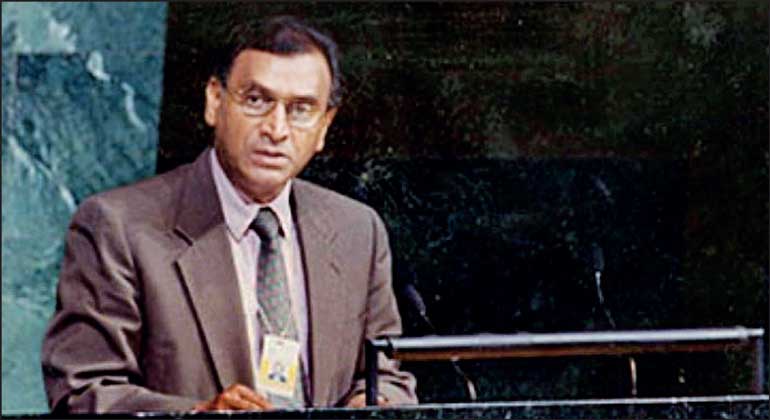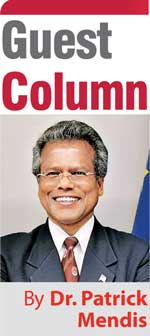Thursday Feb 19, 2026
Thursday Feb 19, 2026
Tuesday, 13 June 2023 00:04 - - {{hitsCtrl.values.hits}}
 Dr. Jayantha Dhanapala
Dr. Jayantha Dhanapala
 Washington, D.C. – The globally respected United Nations diplomat Dr. Jayantha Dhanapala passed away on 27 May 2023, in Kandy, Sri Lanka. He was 85.
Washington, D.C. – The globally respected United Nations diplomat Dr. Jayantha Dhanapala passed away on 27 May 2023, in Kandy, Sri Lanka. He was 85.
Ambassador Dhanapala was a quintessential Sri Lankan—a Buddhist schooled in a Christian and pluralistic society. At an early age, he developed an open mind to foster a better world for all. Selected as an “all-rounder” and winner of the Ryde Gold Medal at the Anglican Church–managed Trinity College in Kandy, the 19-year-old won a prize for his New York Herald Tribune essay titled “The World We Want” and travelled to the United States for a three-month visit in 1957.
The teenager himself never imagined that he was destined to serve as Ambassador of Sri Lanka to Washington in 1995.
I met Jayantha Dhanapala in 1985 when we both served as Sri Lankan Delegates to the UN General Assembly in New York. He was then the Sri Lankan Ambassador to the United Nations in Switzerland; I represented Sri Lanka as its Youth Ambassador (before I became a naturalized US citizen in Minnesota) to the First UN World Conference on the International Year of the Youth in New York.
With a 10-year hiatus, our lasting friendship was revived when Jayantha was appointed as Ambassador to Washington from 1995 to 1997.Along the way, he became internationally prominent after presiding over the most difficult and complex UN World Conference on the Nuclear Non-Proliferation Treaty in 1995. Barbara Crossette described him in her famous New York Times article, “Man in the News: Jayantha Dhanapala” as “the helmsman” who was “a diplomat mostly unknown outside the arms-control world until he was elected to preside over this conference” in May 1995. The article cited that Jayantha may well be a superbly “masterful” future “Secretary General of the United Nations.”
At that time, I was teaching international political economy at the University of Minnesota after my government service in the Minnesota House of Representatives in St. Paul and the US Senate Foreign Relations Committee in Washington. When Jayantha invited me to visit him in Washington in June 1995, he asked me about the visit I organised for former Sri Lankan Ambassador Ernest Corea (1981–86) to Minnesota. We discussed a similar but purpose-driven visit to “the Heart of America” for Jayantha to explore possible US support for his ascension to the UN Secretary-General position against the Minnesota-educated Kofi Annan.
In December 1995, I invited Jayantha to Minnesota to meet with political and academic leaders to gain the needed Congressional support—including an endorsement by US Senator Rod Grams—for the UN post. During a speech at dinner sponsored by the members-only Minneapolis–St. Paul Committee on Foreign Relations, former US Ambassador to NATO, Harlan Cleveland introduced Jayantha to the eminent audience that included former US Vice President Walter Mondale. After thanking Ambassador Cleveland—my American mentor and the founding dean of the University of Minnesota’s Humphrey School of Public Affairs—Jayantha surprised me saying: “Similar to Patrick’s American experience as a teenager in Minnesota, I also visited the United States in 1957 and met Senator John F. Kennedy and President Dwight D. Eisenhower.”

Jayantha kept the Minnesota audience alive with his sense of humor and his vast knowledge of American history. “As a fourth grader, I still remember having to memorise the Gettysburg Address,” said the Sri Lankan envoy, referring to the 16th US President, Abraham Lincoln, and his speech during the American Civil War. The audience was pleasantly surprised when Jayantha recited a few verses of Lincoln’s speech, including “this nation, under God, shall have a new birth of freedom.” For Minnesotans, Lincoln was their first president when Minnesota became the 32nd US state in 1858. Jayantha concluded his indelible speech by quipping that he had wanted to become a journalist; however, after having had the American Dream, he decided to be a diplomat.
When Kofi Annan became the UN chief, he made the brilliant decision to appoint Jayantha as his Undersecretary-General for Disarmament Affairs (1998–2003) at the suggestion of US policymakers in Washington. After the UN reform agenda of 1997, Annan reestablished the Department of Disarmament. Jayantha surely had a challenging assignment—especially before the US launched a ground invasion of Iraq in March 2003 to destroy President Saddam Hussein’s alleged weapons of mass destruction. Jayantha was one of the earliest candidates to express interest in replacing Secretary-General Annan as his second term was coming to an end in December 2006. By then Jayantha had under his belt decades of senior professional experience in corporate management, the Sri Lankan Foreign Service, and the United Nations System. When Ban Ki-moon, the South Korean Minister of Foreign Affairs and Trade, emerged as the front-runner, the Government of Sri Lanka announced that its nominee would withdraw from the race to succeed Kofi Annan. It cleared the pathway for Ban to be the next UN Secretary-General.
After his international civil service, Jayantha pursued university teaching and scholarly interests, and we exchanged our books and other publications. Throughout these years, Jayantha has truly been an inspiration to me and future generations of scholars and diplomats.
For my book Glocalization: The Human Side of Globalization as If the Washington Consensus Mattered, Jayantha wrote an endorsement: “There is no better equipped scholar and researcher of this topic than Patrick Mendis who was born and raised in a developing country and now lives in the heart of the developed world. Trained in the discipline of geography, Dr. Mendis’ book is a multidisciplinary analysis that is both stimulating and eminently readable.”
With his own scholarship and research agenda, Jayantha authored five books and numerous articles on nuclear disarmament, international security, and world peace. Among these books are a MacArthur Foundation supported publication, Multilateral Diplomacy and the NPT: An Insider’s Account (2005) and a collection of his writings and speeches in Sri Lankan Son and Global Diplomat (2019).
Educated at the University of Peradeniya, the University of London, and the American University in Washington, Jayantha spoke Chinese and French fluently in addition to Sinhalese and English. His distinguished career spanned across academia, the corporate world, government, and the United Nations; however, Jayantha claimed that he wanted to be a “practical idealist” even “if it is an oxymoron.” Nonetheless, he maintained the “impartiality” of international civil servants successful in global governance as dictated by Article 100 of the UN Charter.
Indeed, Dr.Jayantha Dhanapala personified the ideal role model of an international civil servant. He embodied a deep commitment to humanity, organisational competence, intellectual curiosity, and undying optimism with a warm personality transcending national borders and cultures. The Ambassador has certainly shown us the power of diplomacy, scholarship, and compassion in fostering a better world. Although Jayantha departed us, his enduring legacy of greatness, empathy, and integrity continues to inspire posterity.
(The writer is a former American diplomat at the US Department of State and a military professor in the NATO and the Indo-Pacific Commands of the US Department of Defense, is currently serving as a distinguished visiting professor of transatlantic relations at the University of Warsaw in Poland. He is an alumnus of the University of Minnesota’s Hubert H. Humphrey School of Public Affairs and the John F. Kennedy School of Government at Harvard University. He could be reached via email at [email protected])